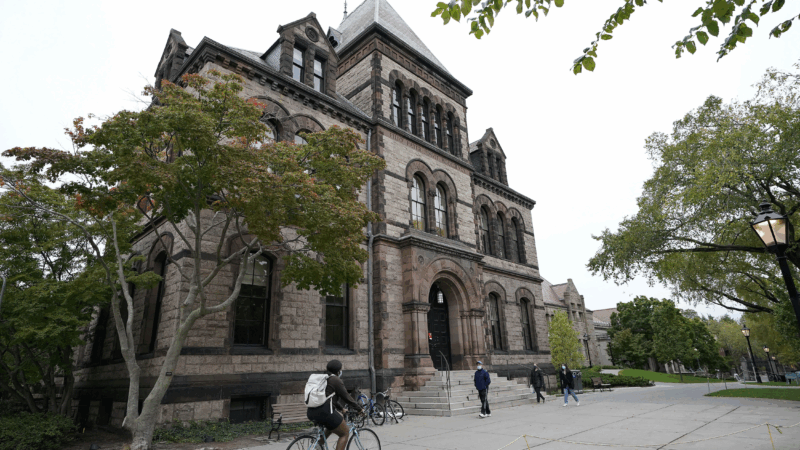Brown University strikes agreement with White House to restore lost federal funding
WASHINGTON — Brown University will pay $50 million to Rhode Island workforce development organizations in a deal with the Trump administration that restores lost federal research funding and ends investigations into alleged discrimination, officials said Wednesday.
The university also agreed to several concessions in line with President Donald Trump’s political agenda. Brown will adopt the government’s definition of “male” and “female,” for example, and must remove any consideration of race from the admissions process.
Brown President Christina H. Paxson said the deal preserves Brown’s academic independence. The terms include a clause saying the government cannot dictate curriculum or the content of academic speech at Brown.
“The University’s foremost priority throughout discussions with the government was remaining true to our academic mission, our core values and who we are as a community at Brown,” Paxson wrote.
It is the latest deal between an Ivy League school and the Trump administration, which has used its control of federal funding to push for reforms at colleges Trump decries as overrun by liberalism and antisemitism. The administration also has launched investigations into diversity, equity and inclusion efforts, saying they discriminate against white and Asian American students.
The Brown deal has similarities with one signed last week by Columbia University, which the government called a roadmap for other universities. Unlike that agreement, however, Brown’s does not include an outside monitor.
The three-year agreement with Brown restores dozens of suspended grants and contracts. It also calls for the federal government to reimburse Brown for $50 million in unpaid federal grant costs.
The settlement puts an end to three federal investigations involving allegations of antisemitism and racial bias in Brown admissions, with no finding of wrongdoing. In a campus letter, Paxson anticipated questions about why the university would settle if it didn’t violate the law. She noted Brown has faced financial pressure from federal agencies along with “a growing push for government intrusion” in academics.
Signing the agreement resolves the government’s concerns without sacrificing university values, she said.
“We stand solidly behind commitments we repeatedly have affirmed to protect all members of our community from harassment and discrimination, and we protect the ability of our faculty and students to study and learn academic subjects of their choosing, free from censorship,” she wrote.
Brown agreed to several measures aimed at addressing allegations of antisemitism on its campus in Providence, Rhode Island. The school said it will renew partnerships with Israeli academics and encourage Jewish day school students to apply to Brown. By the end of this year, Brown must hire an outside organization — to be chosen jointly by Brown and the government — to conduct a campus survey on the climate for Jewish students.
Education Secretary Linda McMahon said Brown’s deal ensures students will be judged “solely on their merits, not their race or sex.”
“The Trump Administration is successfully reversing the decades-long woke-capture of our nation’s higher education institutions,” McMahon said in a statement.
The settlement requires Brown to disclose a wealth of data on students who apply to and are admitted to the university, with information about their race, grades and standardized test scores. The data will be subject to a “comprehensive audit” by the government.
It bars Brown from giving preference to applicants because of their race. A 2023 Supreme Court decision already forbids such consideration, but the deal appears to go further, stopping Brown from using any “proxy for racial admission,” including personal statements or “diversity narratives.”
The $50 million in payments to local workforce development organizations agreed to by Brown are to be paid over 10 years.
That’s “a step forward” from paying a fine to the government, as Columbia agreed to do, said Ted Mitchell, president of the American Council on Education, an organization of major universities. Still, Mitchell said, it remains unclear whether Brown and other universities are clear of governmental pressure.
“Let’s remember, these are deals. These are not policies,” Mitchell said. “I had hoped that the Trump administration, when it came in, was going to be interested in having serious policy discussions about the future of higher education. They’ve yet to do that.”
Columbia last week agreed to pay $200 million to the government as part of its settlement. In negotiations with Harvard, the Trump administration has been pressing for the Cambridge, Massachusetts, school to pay far more.
In another agreement, the University of Pennsylvania pledged to modify school records set by transgender swimmer Lia Thomas, a deal that included no fine.
Homeland Security suspends TSA PreCheck and Global Entry airport security programs
The U.S. Department of Homeland Security is suspending the TSA PreCheck and Global Entry airport security programs as a partial government shutdown continues.
FCC calls for more ‘patriotic, pro-America’ programming in runup to 250th anniversary
The "Pledge America Campaign" urges broadcasters to focus on programming that highlights "the historic accomplishments of this great nation from our founding through the Trump Administration today."
NASA’s Artemis II lunar mission may not launch in March after all
NASA says an "interrupted flow" of helium to the rocket system could require a rollback to the Vehicle Assembly Building. If it happens, NASA says the launch to the moon would be delayed until April.
Mississippi health system shuts down clinics statewide after ransomware attack
The attack was launched on Thursday and prompted hospital officials to close all of its 35 clinics across the state.
Blizzard conditions and high winds forecast for NYC, East coast
The winter storm is expected to bring blizzard conditions and possibly up to 2 feet of snow in New York City.
Norway’s Johannes Klæbo is new Winter Olympics king
Johannes Klaebo won all six cross-country skiing events at this year's Winter Olympics, the surpassing Eric Heiden's five golds in 1980.







